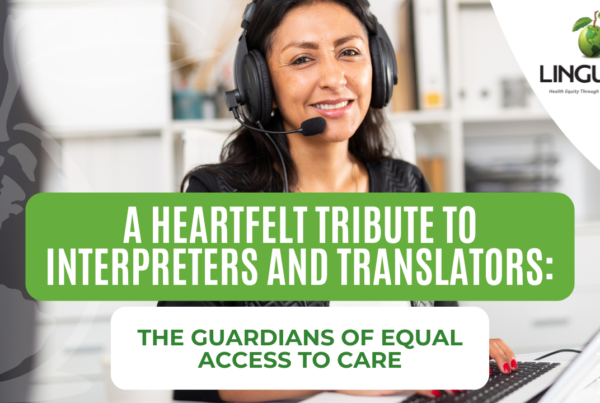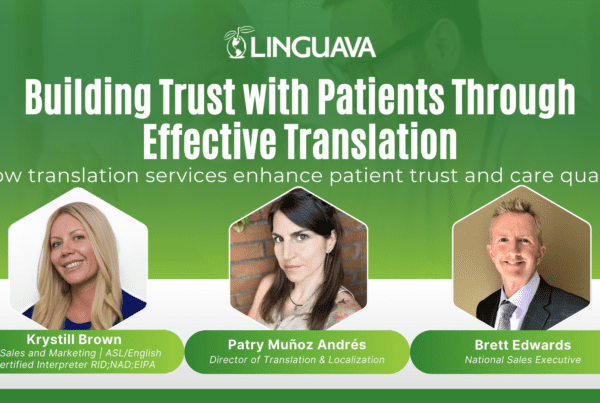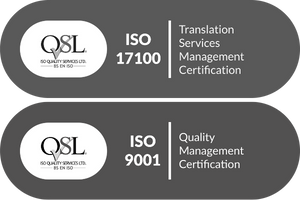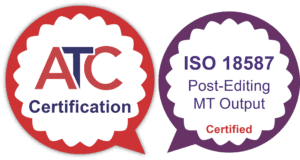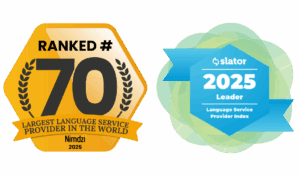David Brackett sits down with Ceci Maldonado, Translation and Localization expert to discuss a variety of topics, trends, and challenges in this industry. They answer questions like, Can cheap translation services work effectively? Can I have a staff member translate our company documents? The upward trend of having more control over the quality and cost of translations joins the growing relationship between the translation and localization vendor with the client.
“Everything comes down to how good the communication is with a client, and that communication is what makes a good partnership.” ~ Ceci Maldonado
Cecilia Maldonado has 20+ years of experience in the translation and localization industry that includes co-founding, managing and merging language service companies as well as co-founding the first language industry association in Argentina. She also volunteers with different international organizations and has organized more than 30 training events such as the Language & Technology Conference, Think Latin America, and the Vendor Management Seminar in Argentina, Chile, Mexico, Brazil, Ireland, Peru and the United States.
Cecilia is the President of Women in Localization, a member of the Association of Certified Translators of the Province of Cordoba, the Globalization and Localization Association (GALA), the Association of Language Companies (ALC), and co-founder of Translated in Argentina (TinA).
Listen to Linguava’s podcast on all your favorite platforms here.
Connect with us on your favorite social site:
LinkedIn | Facebook | Instagram | Twitter
At Linguava, we are dedicated to reducing communication barriers and providing equity to all members of our community through language access services.
If you are interested in learning more about incorporating language access into your organization or would like to book a training session, contact us today.
Professional linguists are here for you to provide accurate and consistent translations of your documents, software, or website content. Have a document ready to translate? Upload your file and get your free quote!
Transcript – The Invisible Profession Podcast Ep. 023 – Translation and Localization with Cecilia Maldonado
David: Welcome everyone to another episode here of The Invisible Profession. I’m your host today, David Brackett, and I’m excited to meet with our guest today and ask her lots of questions about the Translation and Localization industry. Hope everyone’s having a great day so far and I think you’re really gonna enjoy this conversation.
I’m getting to meet with Ceci Maldonado, who has a very impressive resume and bio. I’m gonna, I’m gonna read just some of it cause I don’t wanna miss any of it. It’s, it’s quite impressive. She’s been in the industry for over 20 years in translation and localization. That includes co-founding managing and emerging language service companies, as well as co-founding the first language industry association in Argentina.
She also volunteers with different international organizations and has organized more than 30 training events such as the Language and Technology Conference, Think Latin America and the Vendor Management Seminar in Argentina, Chile, Mexico, Brazil, Ireland, Peru, and the United States. And as if that wasn’t enough right there, Ceci is also the president of Women in Localization, a member of the Association of Certified Translators of the Providence of Cordoba, the Globalization and Localization Association, also known as Gala and the Association of Language Companies and co-founder, and translated in Argentina. Wow. That’s a lot. Ceci, welcome to the show.
Ceci: Well, I’m old enough, you know. Thank you. Thank you for the welcome. Thank you for the invitation. Thank you for reading out that resume. I mean I’ve been in the industry for quite some time, so, that’s maybe why.
David: And you’re, and you’re joining us today from where?
Ceci: I’m in Cordoba. In Argentina? Yep.
David: In Cordoba. And how’s the weather right now in Cordoba?
Ceci: It’s starting to get beautiful, so yeah. So we’re opposite from the US in terms of weather. Yeah. So it’s very beautiful right now.
David: So Ceci I wanna get right, right into it, you know, you have so much experience and I’d love to learn from you. I know that our audience out there today will have a lot to, to learn from you. And we’re coming up to an interesting time right now in the world and the economy.
We’re coming out of the the pandemic, so to speak out of, you know, maybe we’ll never really be out of this, but getting used to life outside of, of the pandemic. And trying to leave it behind us. And one of the other things that we’re hearing a lot about right, is the recession that depending on how you look at it, right? We’re already maybe in one, but could be getting worse possibly next year. My question for you is when we’re in those kinds of times, people are really start to look at the pocketbook, right? And really looking at, okay, how can, where can we cut costs? And sometimes language industry might be a part of that. And looking at, okay, well maybe we can cut back on, on translation or localization or interpretation. So my, my question for you is, how is it that the cheapest translation is not always the best? And what should people be thinking about when it comes to costs and translation and localization?
Ceci: Oof, that’s many questions in one, but it all depends on the kind of company you are. How much of an impact your translation strategy has. Because I’m almost at the end of the chain in the language services, let’s say. We know, you know, that we are in an industry where there’s like very big companies and then it goes down.
So Latamways, my company, is a regional language vendor, so, for us, the strategy has always been. Long term relationships with our clients and our vendors. So we focus on both sides because we can’t do anything without our vendors and we can’t do anything without our clients. So we always try to look at it as a relationship taking care of the partnership.
But in terms of finding the cheapest solution, that is only possible when you are here for just a one time or you have one need or you don’t have any knowledge about the impact of choosing just a cheap option. It’s going and buying anything else like clothes or anything. If you go for the cheap stuff, I do cheap stuff when I have a costumes party and I only am only going to wear that thing for, you know, in one opportunity.
But it’s not something that you choose when you have a long term commitment or a long term strategy. So, and I don’t think this is happening these days because clients are more educated, they know what they want. We have done a good job educating the client as we say in this industry and the impact that translation has on their communication strategy.
David: Yeah. No, I like the comparison. If you’re going to buy a costume, it’s a one, one time thing. Quality does not matter, right?
Ceci: Exactly.
David: But something that you’re gonna be wearing longer term. You want the quality and something that’s going, going to last.
Ceci: Exactly right. Yeah.
David: And along the similar lines there are some clients people might come across that would say, well, you know, we have someone in house that is bilingual, and we have them do our translation or we have them do our, even the quality checking.
Right?
Ceci: Control.
David: Quality control. And so what are some of the challenges that a client might run into by trying to leverage someone who happens to be bilingual and not working with a professional company that’s, that’s trained?
Ceci: Well, it’s it, it brings to mind a very recent example of a client that approached us because they’re not happy with the vendor that they have, and they want to go to the source directly.
So someone in, they’re trying to communicate with Latin America. So they contacted us about translating for Latin America with a Latin American company because they were going to improve their quality. And we had this meeting. It was amazing. We aligned. They said, we are not happy with what we’re getting right now.
It seems that they’re very little. They don’t really know the culture, blah, blah, blah. So I’m like, okay. Because I go for the long term relationship. I’m like, okay, let’s not really start just off yet. Let’s start with a test. So you see how we work and we submit the test, and then we get the feedback.
And when we, when we get the feedback, we’re like, okay, this is not what we discussed. So apparently there’s Spanish speaking in-house person, or you know, an expert in the topic, but not necessarily in language. Introduced so many errors in that correction. It was so not appropriate.
The challenge is more on us because how do we explain to that potential new client? That their bilingual person is great, that they have a bilingual person in staff, but they not necessarily know the language or the rules or the culture, or why we choose a word over another word, or why we decided to transcreate certain, you know, sections because they didn’t make sense in Spanish.
So the idea is, you’re always communicating with the people that you’re working with so that you align in terms of what is expected, what you can provide, and and why there are certain things that are done in certain ways and not necessarily the way they choose.
The bilingual person living outside of the country where they’re translating, they lose touch with and their Spanish, let’s say, gets contaminated and you don’t necessarily know how bilingual they are. Right? So bilingual doesn’t mean you can communicate in both of the languages, but that doesn’t necessarily mean that you can translate.
And that is why we go to university. I’m a translator. I went to university for five years to become a professional certified translator. So it’s a university degree. So there is a difference. I know it, it’s kind of controversial because in the US especially, there are a lot of people working as translators who are not necessarily professional translators.
But I’m, I’m referring to the bilingualism and not necessarily the, you know, getting into the job, so.
David: Yeah. I remember one time I was actually interpreting at a clinic and there was one of the providers there that, that spoke Spanish. Right. And she, her Spanish was not good, let’s just say that.
And the patient was looking at me, I could tell that they didn’t really understand. And she was like, oh, I speak Spanish. And so I was like, okay, well, you know, just let me know how you’d like to utilize my services. And and at the end, you know, I checked in with the patient, you know, just to see if everything was understood.
And they were like, you know, not really. And I, you know, I talked with the, the director of that organization afterwards, just about, you know, about the training, the necessary and just this kinda like what you said, the difference between someone who might be bilingual and working with a trained organization.
And here they are working with us, but not really working with us. Right. And they were like, oh, wow. That’s good to know. I, especially since this person also translates all of our documents. And I was like, wow, that’s that’s not good.
Ceci: There’s, I know many professionals who are not professional translators who are great at their job at translating because they’re subject matter experts.
They bring their expertise from a very different perspective. Don’t get me wrong, cuz there are many in our industry that are not necessarily professionally trained. But Bilingualism per se. Like, just the fact that you’re bilingual doesn’t necessarily make you the right person to do quality checks.
Especially if you’re and there’s a component of trust here, if you’re , if you’re hiring or working with a translation company with 20 plus years of experience and you don’t like what they do, so then you have a meeting you know, and it’s important to have that instance of that meeting where we go over the impressions because it’s all about expectations too, right?
So, and when there are so many different teams, working together in a marketing campaign, let’s say. So the marketing team has one idea, and then the bilingual quality control has another idea. So that’s where the misalignment occurs. It’s important that everybody meets, aligns, and then there’s success in the translation of that campaign.
Otherwise it’s, it’s very difficult to have a successful end product.
David: Yeah. No, definitely. And it’s, and I think just like you touched on as well, a lot of it comes down to the education up front. Right. Walk me through what that should look like when maybe you’re working with a new client. helping make sure that they understand.
Where does the style guide come into play? How can that help set up the long term relationship for success and ultimately build that trust you’re talking about?
Ceci: Exactly. Yeah. Well, we try to align on many different aspects. Terminology is very important. Many times you talk about localization and that doesn’t necessarily mean the other person says or thinks about localization the same way.
Editing, proofreading. There’s so many, even though the terminology is, might be the same. Everybody says different words for the same service, maybe. So we try, when we have these meetings, we try to align in terms of terminology and expectations. For us, it’s very important that we understand the client’s expectations in terms of service level.
And service level includes, you know, how much you want us to produce without prior notice or, you know, response times and times of operation, hours of operation during the day with all the different time zones. And that’s why I stress communication cuz everything comes down to how good the communication is with a client and that communication is what makes a great partnership, right?
So if the channels are open, if I can talk to you anytime I have a question, every time I have a doubt in terms of what you’re expecting. Then it’s, it’s very likely that relationship is going to last for many years. And then my, the clients I’ve had for 20 plus years, that’s exactly what the kind of relationship that we have.
Very open, every time we can we meet. Every time we can, we talk. And if they have something that it’s a new client change in the current status of the way we do things, then they come to me and they say, Hey, I have this new client. It will need that we change all of these, you know, workflows, expectations, hours of operations, whatever.
But it’s gonna happen only for these clients. Can you do it? That’s a partnership for me. That’s what you know what helps everybody have a better day to day in the end, that’s what, you know, we’re all looking for.
David: And you’ve been such an innovator and participator in our organization and industry, is it pertains to these different organizations that you help lead.
Talk to me a little bit about the Women in Localization. How did that get started and where do you see that organization going right now? And for anyone that might be interested in joining? What opportunities are there?
Ceci: Sure. So Women in Localization started 15 years ago. It’s going to be 15 years next year in the Silicon Valley area, and where there, where these three ladies saw that there was not, there were not the same opportunities for women as there were for men.
Even though where I, in Argentina, the localization industry is mainly dominated by women. Not necessarily the case in the US in terms of, you know, these big or larger positions. So what they did was start a group to start talking and connecting with women in the area so that they could empower each other, train, educate, and connect.
And 15 years later, it’s an organization of more than 8,000 members around the world. 27 chapters and a lot of amazing women that volunteer their time because it’s only volunteer based driven, volunteer driven organization. And every woman that volunteers with us is a true believer in our mission and likes to collaborate, likes to train and connect with other women in our industry.
I think that we will continue to grow in terms of now that we are out of the pandemic, let’s say we’re going to continue to expand in different countries because we believe in local communities. We do have a global community where everybody can go and join remotely from anywhere in the world.
But we also believe in the strength of local communities, generating these local communities where women can connect with each other, know what’s going on in their local communities, and that favors training, mentorship, even, you know, job positions. And by knowing more women and they, they can have access to different opportunities that maybe if they, you know, they couldn’t have, like in my, I joined Women in Localization more than five years ago, even more than that, and I started I’ve just been in love with how many learning opportunities there were for me there. Coming from Argentina, building my own company, it’s like I, I would’ve never had the chance to work with women of such caliber. Women in Silicon Valley.
VPs of, you know, multinational corporations or software companies or and if you are, smart enough to take advantage of that situation and learn from these women how they operate in a meeting, how they talk, how they, the words they use, the expressions they use, the, you know, how they deal with conflict, how they deal with certain difficult topics.
I mean, it’s, you know, it’s amazing. So I of course encourage anyone who wants to have an amazing learning opportunity and to join Women in Localization. It’s free and you can have, you can join in many different capacities. You can just be a member or you can be a volunteer. There’s nothing like volunteering with an organization for you to learn more and connect at a different level.
David: Those listening that want to maybe get involved or ask more questions, where would they go?
Ceci: womeninlocalization.com or find me on LinkedIn. So it’s easy, yeah.
David: Well, no I applaud you for just how
Ceci: involved
David: you are in our young, but, but very robust industry.
And it’s people like you that really make the difference and open, open the doors and pave the way for other people to continue on and build a larger industry that we are all contributing towards. And at the end of the day it’s about all of us coming together and having a seat at the table so that each stakeholder has a voice in what we’re doing and exactly creating that, that access.
So as we, as we’re getting close to wrapping up the conversation, Ceci, if I was to ask you where do you see Translation and Localization, let’s say three to five years from now? How, from your experience, from your vantage point, I know that’s a tough question, but how do you see things continuing to evolve?
Ceci: From our perspective regional language vendor, what we’ve seen as changes in the past few years in terms of requests of course there’s more machine translation than ever. There’s more multimedia requests than ever subtitling, voice over. There’s more connection. There’s we’ve seen more requests coming from clients directly than ever before too.
And I’ve had the opportunity to talk to some of them and ask them why now and not before. And there’s a trend to have more control over quality and cost than ever before talking about recession and stuff like that. So. It ends up being a longer journey for a client many times, and going directly to the vendor.
They have the structure of course, that I’ve already, I’ve also talked to some of my friends in these big corporations, and they don’t have the structure to handle multiple vendors. So, but there is a trend of clients going to regional language vendors, single language vendors to have more control over quality and cost.
And I think that’s going to be sort of the, you know, the way the industry continues to move to, of course, in terms of the bigger, larger players, more M and A’s. As we see them every day, more consolidation, which is, you know, something to think about, right? We’re always on the alert on this side of the world, right?
Always watching, always trying to readapt. If there’s something that Argentinians have as a very top quality is flexibility, we’re so used to a very changing economy and atmosphere that we are very easily adaptable and have a very fast way to just, you know, change things around. So on the alert, all the time.
David: And Ceci, as we wrap up as well what would you want to leave our audience with as far as one truth that you would love to share with them as it pertains to anything from professionalism to our industry.
What would be the one truth you would love to to leave everyone with today?
Ceci: I think that anything is possible as long as you have a positive perspective, you have that capacity to adapt and change, and reroute as we, as the GPS says, “recalculando” right? So it’s, it’s, I think it’s interesting to have that sort of chip or mindset where changes are okay, we just need to adapt.
If you want change, you need to actively engage and do things from a very positive perspective, and again, I put let me bring Women in Localization as an example. These ladies wanted to change the situation of women. They didn’t go out with signs saying, women deserve the same opportunity as men.
Women need to get paid the same as men. What happened was they had a very different approach. They started training women so that they could have access to the same positions and be prepared to have the same opportunities. They started mentoring, educating, and connecting these women. That kind of engagement is what I’m talking about.
So that’s why I belong to Women in Localization. That’s why I believe in their mission. That’s why I work with these women, and as one of my mentors said, preparation meets opportunity. So as long as we prepare people, we give them information and they know what they are dealing with, they’ll always be prepared for whatever they want to achieve.
David: Well thank you so much, Ceci. That’s that’s powerful and that’s very deep. I think, you know, you hit the nail on the head when you said, you know, taking anyone can say something or make a post or hold a sign, but it takes a different type of person to take that, that step and really take that action. And that’s what you’ve done. That’s what you’ve based your career on. And because of that now, a lot of others have been able to do that as well, and create these amazing opportunities in our industry. So yeah, just as Ceci said be encouraged and be inspired to take those steps.
It all starts with one step, and one decision and you all have the opportunity to do that right now and reach out to Ceci from for Women in Localization or any other volunteer opportunity that inspires you. So Ceci, I just wanna thank you again for the work that you’re doing, the volunteer work, just how committed you are to the growth and empowering people in our industry.
It’s truly admirable to to be a partner with you and we’ll hope to connect again very soon.
Ceci: Of course we will. Gracias por la invitación,
Thank you very much for the invitation. My pleasure.
David: That’s right. All right.



